
Combating Imposter Syndrome
Imposter syndrome is a feeling of self-doubt that affects how workers view their abilities and qualifications when they don’t think they belong or deserve their job. It can affect an employee’s work by impairing job performance, contributing to burnout, and reducing overall job satisfaction.
With an increase in remote work environments, imposter syndrome has worsened due to a lack of in-person interaction. Face-to-face interactions can provide feedback through body language, which employees lack when working from home. When working from home, workers can also become distracted by things such as pets and children. Furthermore, these distractions can increase stress and anxiety, contributing to self-critical feelings about job performance.
All of those factors can negatively impact your well-being as an employee. Consider these strategies to help combat imposter syndrome, including when working from home:
- Let negative thoughts come and go. Negative feelings towards yourself are common. To combat the anxiety associated with them, it can be helpful to recognize them and avoid giving them further thought. Avoid being too hard on yourself.
- Get together with co-workers. If there are in-person events at your workplace, consider attending them to interact face-to-face with co-workers. You could also consider scheduling a working lunch or post-work happy hour with a co-worker.
- Talk about your experience. Sharing about your experience with imposter syndrome can help both you and those you work with feel less alone. Share your advice with co-workers to help spread knowledge and awareness.
- Practice positive self-talk. Practicing affirmations and writing down the facts can weed out the false accusations in your head. Write down the positive ways you contribute to your workplace so you can recognize your accomplishments.
- Have self-compassion. Perfection is not possible. When you’re experiencing negative thoughts, it’s essential to be kind to yourself. It’s also important to recognize that you were hired for your role for a reason.
You don’t have to combat imposter syndrome alone. Working remotely can foster feelings of isolation, but imposter syndrome affects millions of workers each year; therefore, it’s important to know you’re not the only one affected. Knowing how to combat it can help you and those you work with.
Prioritizing Your Well-being
In recent years, there has been a shift to organizations allowing employees to work remotely. This remote work option has given employees more time to focus on their well-being. While remote work can help improve overall job satisfaction, it can also have some adverse effects. Some aspects of remote work can negatively impact your mental health and, as a result, affect your physical well-being and job performance.
Driven in part by this social isolation, remote employees have started to shift towards prioritizing their well-being. With the increase in employees working from home, there has started to be a more significant focus on using extra time that was previously for commuting on other nonwork-related tasks. Some of these activities include extra sleep, leisure activities, and home projects.
As a result, focusing some attention on your well-being will improve not only your physical and mental state but also your work experience. To prioritize your well-being, consider trying some of these strategies while working remotely:
- Connect with co-workers. Connecting with others is important when working remotely to combat feelings of isolation. Make time to connect throughout the week by planning meet-ups such as post-work walks or lunches.
- Exercise for 30 minutes daily. Exercise can help boost your mood and improve your overall well-being. Some typical workouts include yoga, biking, walking, and stretching.
- Schedule regular breaks. Take breaks throughout your day to help prevent daily burnout. Small breaks in your workday could include taking a short walk or making a snack.
- Create a designated work space. When working in a remote environment, it’s important to have a space designated for work. This space should be somewhere you feel productive, such as a desk. Spaces like your bedroom or couch are associated with relaxation, so they may not be the best locations to be productive during the day.
If you’re a remote or hybrid employee, consider trying some of these tips to help prioritize your physical and mental health.
Every workplace is different, so consider how prioritizing your well-being can fit into your schedule. You could also reach out to your manager or co-workers to discuss prioritizing your well-being.
For more information on Capital Services, scan below!





